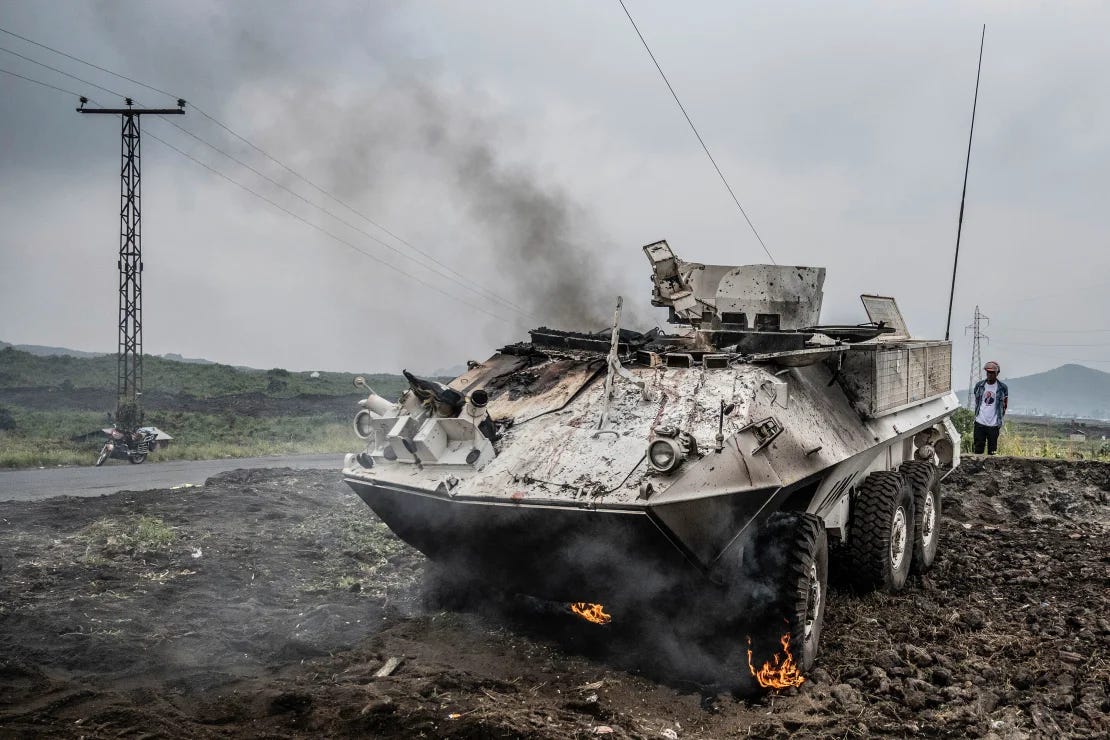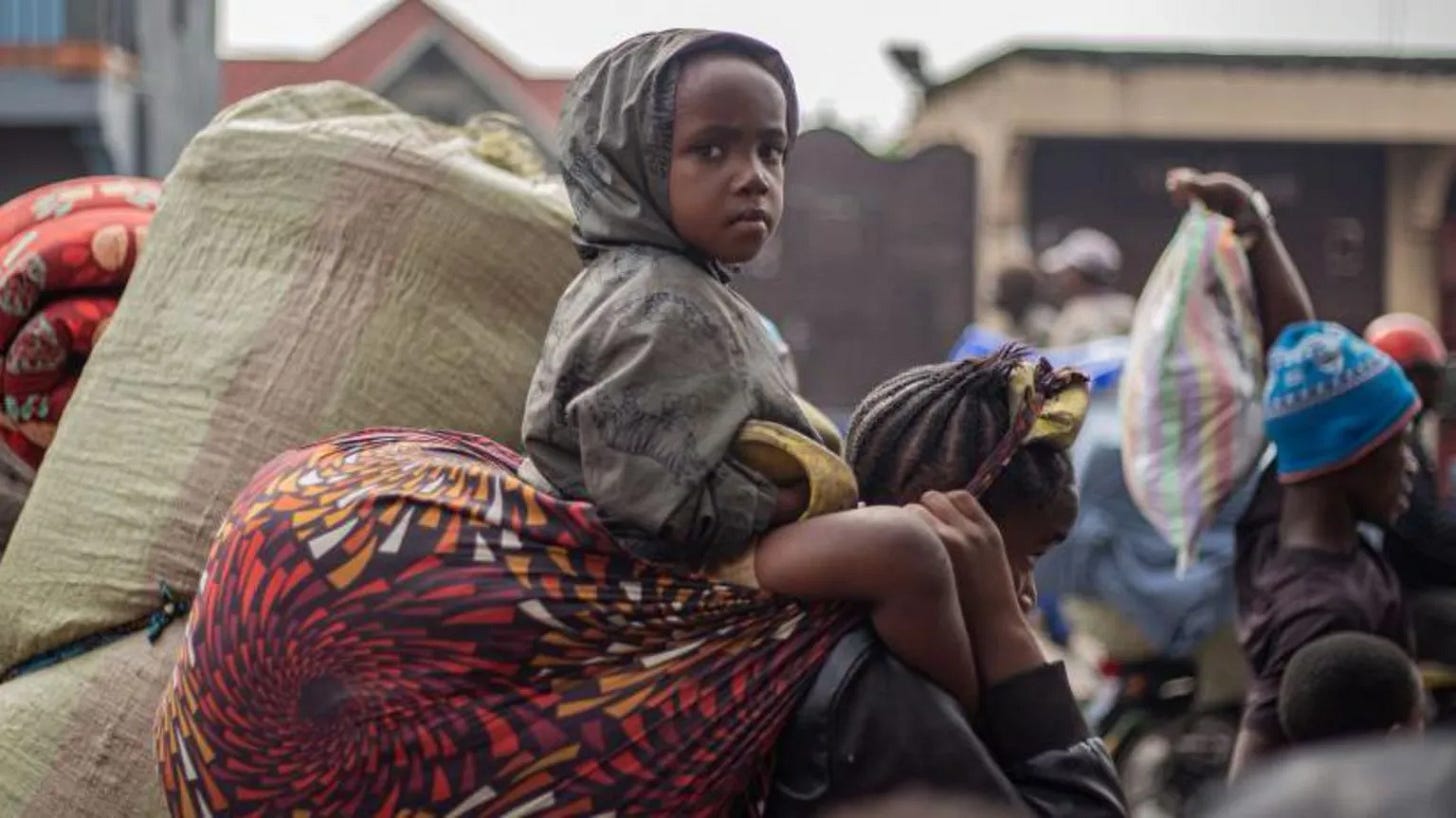As fierce fighting erupts in the Eastern Congolese city of Goma, home to roughly 2 million people, the intensity of conflict reveals deep-rooted governance challenges and underscores the urgent need for an inclusive approach to peace and security. Thousands of civilians continue to flee in the wake of the M23 rebels’ latest offensive—a stark reminder that the Democratic Republic of Congo (DRC) is once again at the epicenter of one of Africa’s gravest humanitarian crises.
A UN armored personnel carrier burns during clashes with M23 rebels outside Goma, Democratic Republic of the Congo, on Jan. 25, 2025. Moses Sawasawa/AP
The Offensive on Goma
Rebels Advance
Reports from Goma indicate the M23 rebels have pushed into critical parts of the city, marking the fiercest surge of violence in years. Videos circulating on local media and BBC broadcasts show rebel patrols on main roads and terrified residents sheltering indoors.
Chaotic Exodus
Tens of thousands have been on the move—some crossing into neighboring Rwanda and others seeking safety within North Kivu province itself. Many families have fled multiple times in recent weeks, highlighting a recurring cycle of displacement with no clear refuge.
Collapse of Basic Services
The Goma airport, a vital hub for humanitarian aid and trade, has been shut down amid shelling. Power and water cuts are reported across multiple neighborhoods, and the city’s Munzenze prison was set ablaze, resulting in the escape of thousands of inmates.
Photo: AFP
Accusations and Regional Complexities
Rwanda’s Alleged Involvement
Both Congolese officials and United Nations experts accuse Rwanda of backing the M23’s resurgence, a claim the Rwandan government continues to deny. Rwanda instead cites the threat of Hutu rebels, including those linked to the 1994 genocide, to justify its presence near the border.
Diplomatic Strains
The conflict has severely strained relations between Kinshasa and Kigali—Congo recently cut diplomatic ties with Rwanda, citing “frontal aggression.” President William Ruto of Kenya has called for an urgent summit of East African Community leaders to de-escalate tensions.
A Fractured Landscape
The M23 is among an estimated 100 armed groups competing in a mineral-rich region rife with gold, coltan, and cobalt. Historical grievances intertwine with modern geopolitics, as countries in the region jostle over security interests and economic advantages.
Humanitarian Crisis Worsens
Mass Displacement
Over 6 million people are currently displaced within the DRC, many of them concentrated in the embattled eastern provinces. This year alone, the UN refugee agency (UNHCR) estimates that hundreds of thousands have been uprooted from their homes in North and South Kivu.
Civilian Toll and Fear
Hospitals are reporting an influx of wounded residents, and local civil society groups fear that renewed fighting will further deteriorate already dire conditions in overcrowded displacement camps. Access to essential resources—food, clean water, and healthcare—remains perilously low.
International Responses and Local Appeals
UN Security Council Condemnation
The UN Security Council has demanded an immediate withdrawal of the M23 from Goma, condemning the violation of Congolese sovereignty. Western powers—including the United States, United Kingdom, and France—echo these calls, urging an immediate ceasefire.
Peacekeeping Setbacks
The UN peacekeeping mission (MONUSCO), along with regional forces such as the Southern African Development Community Mission (SAMIDRC), has incurred casualties amid heavy fighting. Troop contributors like South Africa, Uruguay, and Malawi report multiple fatalities and injuries.
Congolese Government Position
Authorities in Kinshasa maintain that the army still holds strategic locations, including the airport. Government spokesman Patrick Muyaya has urged unity, calling on Congolese citizens worldwide to mobilize in defense of their homeland.
Pathways for Peace, Governance, and Inclusive Solutions
Despite the gravity of the crisis, there remain avenues to stabilize eastern Congo and foster long-term peace:
Inclusive Regional Diplomacy
Ceasefire and Dialogue: Immediate cessation of hostilities is vital. The East African Community, African Union, and other stakeholders must proactively facilitate talks between the Congolese government and armed groups, including M23.
Cross-Border Mechanisms: Strengthened confidence-building measures and transparent resource-sharing agreements can reduce suspicion between neighboring states.
Human-Centered Governance Reforms
Accountable Leadership: Congolese institutions must prioritize curbing corruption and incorporating ethnic minorities in decision-making. Transparent electoral processes remain a cornerstone for democratic consolidation.
Justice and Reconciliation: Special mechanisms to address wartime abuses and incorporate marginalized communities—including displaced peoples—can help break the cycle of grievance-based rebellions.
Humanitarian Assistance and Safeguards
Scaling Up Relief: Governments and NGOs need to bolster food, shelter, and medical supplies to displacement camps. International donors should expedite humanitarian funding to avert further catastrophe.
Protection of Civilians: Peacekeeping mandates should be sharpened to guarantee civilian safety, while also supporting local civil society initiatives that foster resilience and reconciliation.
Leveraging Tech Innovation
Digital Monitoring of Human Rights: Mobile apps and geospatial technologies can enhance real-time tracking of atrocities, helping hold perpetrators accountable and speeding aid response.
Transparent Supply Chains: Blockchain-based systems and digital platforms for mineral traceability can reduce illicit trade, ensuring profits from cobalt and coltan benefit local communities rather than fueling conflict.
In the face of renewed violence and humanitarian crises, the Democratic Republic of Congo still possesses immense potential for peace and prosperity—rooted in its rich cultural heritage and abundant natural resources. A coordinated, inclusive approach to governance, anchored by regional partnerships and transparent leadership, can pave the way for lasting stability. By harnessing technology, empowering local communities, and honoring commitments to diversity and justice, Congo and its neighbors can transform long-standing animosities into a resilient foundation for equitable growth.
#CongoCrisis #GomaUnderSiege #Africa #ConflictResolution #InclusiveGovernance #PeaceBuilding #PolicyMatters #HumanitarianAid #TheInclusivePolicyDigest
Why Subscribe to The Inclusive Policy Digest?
Stay Ahead on Policy Insights – Our real-time analyses shed light on how conflicts and governance issues across Africa shape the broader geopolitical landscape.
Empower Your Leadership Journey – Gain strategic tools for conflict resolution, civic engagement, and innovation in the public sector.
Learn from Real-World Successes and Challenges – Discover how diverse teams navigate crises, develop leadership skills, and foster inclusivity.
Access Exclusive Commentary and Community – Join a worldwide network of leaders, activists, and innovators committed to equity and responsive governance.
Champion Social Justice & Sustainable Development – Elevate the transformative power of inclusive policies for a just and vibrant Africa.
Subscribe today to The Inclusive Policy Digest to stay informed, engaged, and inspired in shaping Africa’s future. Let us stand in solidarity with the people of Congo and champion a vision of peace, progress, and inclusive governance for all.






